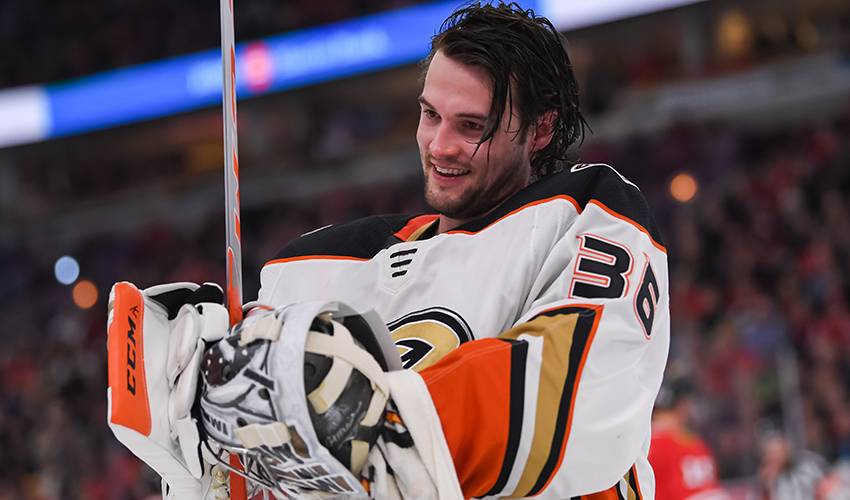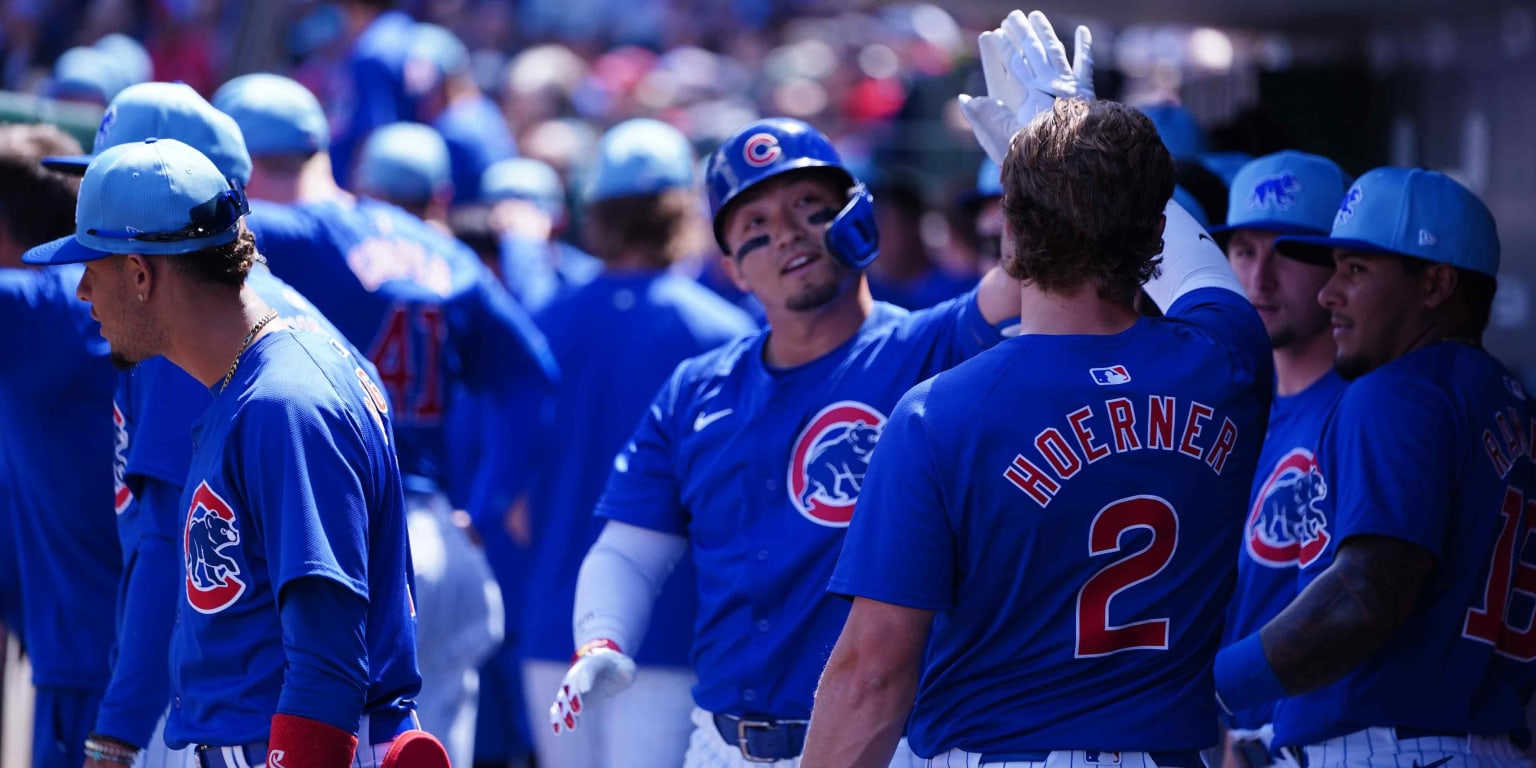For the first time since the 2015-16 season, when John Gibson competed for goaltending duties with Frederik Andersen, the Anaheim Ducks will face a goalie competition as training camp begins in September. Gibson, who has been the Ducks’ main goalie for nearly 10 seasons, was significantly challenged by Lukáš Dostál in the 2023-24 season. Dostál earned more starts late in the season, making a strong case to become the team’s primary goaltender over Gibson.
This situation leaves both Gibson and the Ducks in a difficult position. At 31 years old, Gibson likely still has a lot to offer. However, the Ducks’ future goaltender, Dostál, has shown his skills and potential, hinting at his readiness to take over. Although Gibson’s talent would be more effective on a stronger team—hence the persistent trade rumors—having two capable goalies isn’t necessarily a bad thing. But what should the Ducks do? Let’s explore the arguments for both trading Gibson and keeping him.
Ducks Missed Out on Gibson’s Prime
Last week, I compared Gibson to Cam Fowler, noting that much of their prime years were spent during the Ducks’ decline from a Stanley Cup contender to one of the league’s worst teams from 2018 to 2023. During this time, the Ducks underwent significant personnel changes, including the buyout of Corey Perry and the retirements of Ryan Kesler and longtime captain Ryan Getzlaf. The team also saw key players like Hampus Lindholm, Josh Manson, and Rickard Rakell leave, contributing to the Ducks’ struggles, including historically poor defense and goal differential in the 2022-23 season.
The five seasons from 2018-19 to 2022-23 covered Gibson’s prime years, ages 25-30, which are typically when a goaltender should be at their best. However, as time went on, he had less support in front of him, particularly in defense and goal-scoring. While his statistics may not be impressive, his athletic and acrobatic goaltending style was often the reason the Ducks didn’t lose more games.
Gibson is not without fault—he’s had off nights, let in goals he shouldn’t have, and may have cost the Ducks some games. Sometimes, his body language suggests a lack of motivation. However, considering that no goalie has faced more shots in recent seasons than Gibson, it’s hard to place all the blame on him.
During his time as the Ducks’ starting goalie, they made three playoff appearances, including a deep run to the 2017 Western Conference Final, where they lost to the Nashville Predators in six games. He showed his worth even earlier, making a surprise appearance as a 20-year-old in the Ducks’ 2014 second-round playoff series against the Los Angeles Kings and winning two crucial games. Despite his limited playoff experience, he has demonstrated his ability to perform in big moments. Unfortunately, we haven’t seen that in the past six seasons, raising the question of whether there’s a team out there that would want Gibson in their net for meaningful games. With that in mind, let’s consider why the Ducks might consider trading Gibson.
Trade Him Because: He Could Fetch a Decent Return (But It Won’t Be Easy)
Although Gibson’s statistics might suggest he’s a below-average goaltender, his talent is evident to the eye, and he has much to offer teams in need of goaltending talent or depth. Some understanding is needed, as goalies for struggling teams like the Ducks typically have poor stats, and Anaheim has been near the bottom of the league for several seasons. At 31, Gibson likely has many good years left. He’s big, athletic, and quick, with the ability to keep one of the NHL’s weakest defensive teams competitive. Although he hasn’t played in the playoffs since 2018, his experience could make him an upgrade for several teams, potentially bringing a solid return in a trade.
A middle-six forward, a second-pairing defenseman, or a decent draft pick could be possible returns for Gibson. However, general manager Pat Verbeek may find it challenging to secure that. Gibson has dealt with injuries over the years and was outperformed by Dostál in the latter part of the 2023-24 season. Additionally, he has a cap hit of over $6 million until he turns 33. While he has playoff experience, it’s uncertain how he would perform in high-pressure situations given his long absence from postseason play. Any team interested in him would need the financial flexibility and a willingness to take on some risk.
Trade Him Because: It’s Time to Hand the Reins to Lukáš Dostál
Another reason to trade Gibson would be to officially usher in the Dostál era in Anaheim. Dostál’s age aligns with the rest of the Ducks’ roster, making it inevitable that he will become the main goalie. He proved capable throughout his first season with a significant workload, and he outperformed Gibson in almost every category with the same team in front of him. Delaying Dostál’s career progression would be pointless if this is the case.
If the Ducks decide to make Dostál their primary goalie, they could keep Gibson as a backup. While it’s not the worst idea to have two NHL-ready goalies on the roster, it’s expensive. For Gibson, being a backup or a 1B option on a rebuilding team might be less desirable than starting on a rebuilding team. A trade could put him in a more competitive situation. However, let’s now consider the reasons to keep him.
Keep Him Because: The Ducks Lack NHL-Ready Goaltenders
Goaltending has traditionally been a strong point for the Ducks throughout their 30-year history. From Guy Hebert to Jean-Sébastien Giguère, Jonas Hiller, Andersen, and Gibson, the Ducks have rarely struggled with goaltending. This remains true today, as the future of the position seems secure with prospects like Tomas Suchanek, Calle Clang, and Damien Clara in the pipeline. However, none of these goalies are NHL-ready, and it may be a while before they are. Moreover, not all of them will reach the NHL level. Unless the Ducks find a veteran backup if they trade Gibson, they could suddenly find themselves thin at the position. Therefore, keeping Gibson around makes sense, at least until Dostál consistently proves he can handle the workload of a starting goalie. Dostál appeared in 44 games last season, but he’ll need to do that or more again to prove his reliability. That alone could be enough reason to keep Gibson on the team.

Keep Him Because: He Is Incredibly Talented
Lastly, the most straightforward reason not to trade Gibson is his talent on the ice. Gibson is highly athletic and skilled. While he has never been seriously considered for the Vezina Trophy, he is highly regarded by his organization, teammates, and others in the league. Although Dostál outperformed him in the latter half of last season, one could argue that Gibson still gives the Ducks a better chance to win each night due to his experience and composure in the net. Unless a player is detrimental to the team or there’s a clear advantage to trading them, it’s difficult to justify moving on from someone with Gibson’s abilities.
Ducks Don’t Need to Rush a Decision on Gibson and Dostál
Every organization eventually reaches a point where they must transition from their veteran goaltender. If the Ducks haven’t reached that point with Gibson yet, they are likely close. Head coach Greg Cronin started Dostál 38 times last season, and going forward, it makes sense to give him no fewer starts. However, if Gibson is healthy and performs well in training camp, will he be okay with sharing starts? Gibson appears to be an unselfish player who will do what’s best for the team, but there’s no denying he still has the talent to be a starting goaltender. There are arguments both for and against trading him, and it remains to be seen what Verbeek will do with the longtime Ducks starter, if anything. After all, the Ducks have more pressing lineup issues to address. Stay tuned.



